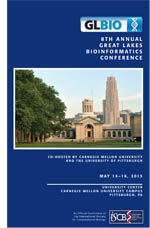| go directly to :[Wednesday - May 15] [Thursday - May 16] |
|
| --> MONDAY – May 13, 2013 |
4:00 pm - 6:00 pm - Registration
University Center, Wean Commons |
5:00 pm - 7:00 pm
Check in location: GLBIO Registration Desk
Hike location: Schenley Park
A Group Hike is planned for Monday, May 13, 2013 through beautiful Schenley Park www.pittsburghparks.org/schenley.
Hikers will meet at the Registration Desk at the GLBIO Conference and additional details will be provided. |
|
| --> TUESDAY – May 14, 2013 |
| 8:00 am - 5:00 pm - Registration |
9:00 am - 11:00 am
Location: McConomy
Tutorial 1
James Faeder
University of Pittsburgh School of Medicine
Markus Dittrich
Pittsburgh Supercomputing Center
Spatial Rule-based Modeling of Cellular Biochemistry with MCell/BioNetGen/CellBlender |
| 11:00 am - 12:00 pm - Lunch |
12:00 pm - 2:00 pm
Location: McConomy
Tutorial 2
Anton Nekrutenko, Penn State University
Exploring and Enabling Biomedical Data Analysis with Galaxy |
| 2:00 pm - 2:30 pm - Break |
2:30 pm - 4:30 pm
Location: McConomy
Tutorial 3
Seyoung Kim, Machine Learning in Biology
Machine Learning in High Dimension for Genomic Data Analysis |
| 4:30 pm - 5:00 pm Break |
KEYNOTE 1: ZIV BAR JOSEPH, Carnegie Mellon University
5:00 pm - 6:00 pm
Location: McConomy
Reconstructing Dynamic Networks in Development and Disease |
6:00 pm - 7:30 pm
Location: Rangos Ballroom
Poster Session A and Reception
> Poster Presentations - Click here for a complete list of presenters. <
|
|
| --> WEDNESDAY – MAY 15, 2013 |
8:50 am - 9:00 am
Location: McConomy
Welcome and Introduction of Keynote speaker |
KEYNOTE 2 - IVET BAHAR, University of Pittsburgh
9:00 am - 10:00 am
Location: McConomy
Protein Dynamics: Relevance to Sequence Evolution and Drug Discovery |
--> LOCATION: CONNAN - Wednesday – May 15, 2013
10:10 am -10:25 am
Algorithm Development & Machine Learning
Jianlin Cheng
University of Missouri, Columbia
Predicting protein residue-residue contacts using deep networks and boosting
10:25 am -10:40 am
Algorithm Development & Machine Learning
Iddo Friedberg
Miami University
A large-Scale Critical Assessment of Protein Function Annotations
10:40 am -10:55 am
Algorithm Development & Machine Learning
Hamidrez Chitsaz De Novo
Wayne State University
Co-assembly of Bacterial Genomes from Multiple Single Cells
10:55 am -11:10 am
Evolutionary, Comparative & Meta-Genomics
Surya Saha
Cornell University
Mining Eukaryotic Meta-Genomes for Endosymbionts using Next-Generation Sequencing
11:10 am -11:25 am
Bioimage Analysis
Robert Murphy
Carnegie Mellon University
Estimating Microtubule Distributions from 2D Immunofluorescence Microscopy Images Reveals Differences Among Human Cultured Cell Lines |
-->LOCATION: McKENNA - Wednesday – May 15, 2013
10:10 am -10:25 am
Biological Networks
Jan Baumbach
Max Planck Institute for Informatics
KeyPathwayMiner - Extracting relevant pathways by combining OMICS data and biological network
10:25 am -10:40 am
Biological Networks
Thair Judeh
Wayne State University
TEAK: Topology Enrichment Analysis frameworK for detecting activated biological subpathways
10:40 am -10:55 am
Biological Networks
Graham Cromar
University of Toronto
Toward a systems level view of the ECM and related proteins: a framework for the systematic definition and analysis of biological systems
10:55 am -11:10 am
Biological Networks
Robert Patro
Carnegie Mellon University
Network alignment using multiscale spectral signatures
11:10 am -11:25 am
Biological Networks
Aviv Madar
New York University
A Validated Regulatory Network for Th17 Cell Specification Biological Networks
11:25 am -11:40 am
Database & Ontologies:
Sorin Draghici
Wayne State University
Detecting Phenotype-Specific Interactions between Biological Processes from Microarray Data and Annotations |
| 12:00 pm - 1:30 pm Lunch and Birds of a Feather |
--> LOCATION: CONNAN- Wednesday – May 15, 2013
1:00 pm - 1:20 pm
Clinical Informatics & Epidemiology
Kun Zhao
Georgia State University
Building a web-based tool to support clinical decisions in the control of Chlamydia trachomatis and Neisseria gonorrhoeae infection
1:20 pm -1:40 pm
Mayur Sarangdhar
Cincinnati Children's Hospital Medical Center
AERSMine: A Phenome-Pharmacome Web Datamine based on the FDA’s Adverse Events Reporting System Data
1:40 pm - 2:00 pm
Databases & Ontologies
Xinghua Lu
University of Pittsburgh
Conceptualization of molecular findings by mining gene annotations Databases & Ontologies
2:00 pm -2:20 pm
RNA & Protein
Masahito Ohue
Tokyo Institute of Technology
Highly Precise Protein-Protein Interaction Prediction Based on Consensus Between Template-Based and De Novo Docking Method |
--> LOCATION: McKENNA - Wednesday – May 15, 2013
1:00 pm -1:20 pm
Algorithm Development & Machine Learning
Renee Drabier
University of North Texas Health Science Center
A Neural Network Approach to Multi-biomarker Panel Discovery by High-Throughput Plasma Proteomics Profiling of Breast Cancer
1:20 pm -1:40 pm
Algorithm Development & Machine Learning
Liang Lan
Temple University
Multi-Task Feature Selection in Microarray Data by Binary Integer Programming
1:40 pm -2:00 pm
Hassan Rafiul
King Fahd University of Petroleum and Minerals
A New Approach to Enhance the Performance of Decision Tree for Classifying Gene Expression Data
2:00 pm -2:20 pm
Luis Rueda
University of Windsor
MicroRNA Identification Using Linear Dimensionality Reduction with Explicit Feature Mapping |
KEYNOTE 3: ISIDORE RIGOUTSOS, Thomas Jefferson University
2:30 pm - 3:30 pm
Location: McConomy
Unraveling the Rules of MicroRNA Targeting: Towards an "Expanded" Model |
| 3:30 pm - 3:45 pm Break |
|
3:45 pm - 5:30 pm
Location: Connan
Career Session
The CV, the Resume, and the Scientist's Job Search: What to Use, When and Why
Presenter: Joe Tringali
Session Sponsor: FASEB MARC Program
Any job search is, at its very core, a self marketing campaign. The best strategy is one that targets your message to the specific audience in order to help them move your candidacy forward. In this session, we will discuss who the audience may be, the message you might wish to convey, the vehicle in which it is conveyed, and the concept of message consistency. Our objective is to maximize the return you get on your efforts
CV, resume, interviewing advice will be offered throughout the conference at the Career Booth!
|
3:45 pm - 5:30 pm
Location: McKenna
Education Session
Educating Biologists and Bioinformatics Professionals for the Future - Are We Getting It Right?
Panel Co-Chairs: Guenter Tusch, Grand Valley State U, and Sarah Elgin,Washington U in St. Louis |
5:30 pm - 7:00 pm
Location: Rangos Ballroom
Poster Session B and Reception
> Poster Presentations - Click here for a complete list of presenters. <
|
| 7:30 pm - Banquet at the Pittsburgh Athletic Association |
|
| --> THURSDAY – May 16, 2013 |
KEYNOTE 4: JING LI, Case Western Reserve University
9:00 am - 9:50 am
Location: McConomy
Haplotype Reconstruction in Large Pedigrees: Recent Development and Applications |
| 9:50 am - 10:00 am - Break |
--> LOCATION: CONNAN - Thursday – May 16, 2013
10:00 am -10:10 am
Personalized Genetics & Genomics
Arnab Saha Mandal
University of Toledo
What do 1000 genomes tell us about Biased Gene Conversion theory
10:10 am -10:20 am
Evolutionary, Comparative & Meta-Genomics
Xuejian Xiong
Hospital for Sick Childen, Toronto
A Systematic Co-Expression and Co-Conservation Study of Chromatin Modification Complexes in Eukaryotes
10:20 am - 10:30 am
Biological Networks
Hongyu Miao
University of Rochester
Inferring Pre- and Post-Transcriptional Regulations in Infectious Diseases
10:30 am -10:40 am
RNA & Protein
Zhenqing Ye
Ohio State University
Computational analysis reveals a correlation of exon-skipping events with splicing, transcription and epigenetic factors
10:40 am - 10:50 am
Biological Networks
Nirvana Nursimulu
University of Toronto
Metabolic reconstruction and analysis explain differences in virulence of dominant strains of Protozoan parasite Toxoplasma gondii
10:50 am - 11:10 am
Biological Networks
Marzieh Ayati
Case Western Reserve University
Scoring protein subnetworks in terms of their disease association and network connectivity: How to compare apples and oranges?
11:10 am -11:20 am
Algorithm Development & Machine Learning
Naoki Orii
University of Pittsburgh
Inference-analytics: A necessary next step to translate computational predictions in biomedical sciences |
-->LOCATION: McKENNA - Thursday – May 16, 2013
10:00 am - 10:10 am
Algorithm Development & Machine Learning
Jordan Fish
Michigan State University
Xander: Tool for Gene-targeted Metagenomic Assembly
10:10 am -10:20 am
Databases & Ontologies
Chun Liang
Miami University
YouGenMap: your place to load, share and compare genome maps
10:20-10:30
Bioinformatics
Andrew Plassard
Cincinnati Children's Hospital
Applications of Computer Vision to High-Throughput Screens
10:30 am - 10:40 am
Bioimage Analysis
Devin Sullivan
Carnegie Mellon University Predicting Subcellular Localization of Small Molecules from their Structural Features
10:40 am -10:50 am
Bioimage Analysis
Aparna Kumar
Carnegie Mellon University Automated Analysis of Immunohistochemical Images Identifies Candidate Location Biomarkers for Cancers
10:50 am -11:10 am
Algorithm Development & Machine Learning
Armaghan Naik
Carnegie Mellon University
Active Learning of Drug Effects on Subcellular Patterns
11:10 am - 11:20 am
Bioimage Analysis
Gregory Johnson
Carnegie Mellon University
Image-derived models of morphological changes associated with neuronal differentiation of PC12 cells |
| 11:20 am - 11:30 pm Break |
--> LOCATION: CONNAN - Thursday – May 16, 2013
11:30 am - 11:50 am
Algorithm Development & Machine Learning
Páll Melsted
University of Iceland
Parallel Memory Efficient Algorithms for Constructing de Bruijn Graphs
11:50 am - 12:10 pm
Giri Narasimhan
Florida International University
Better Primer Design for Metagenomics Applications by Increasing Taxonomic Distinguishability
12:10 pm - 12:30 pm
Algorithm Development & Machine Learning
Jan Baumbach
Max Planck Institute for Informatics
BiCluE - Exact and Heuristic Algorithms for Weighted Bi- cluster Editing of Biomedical Data |
-->LOCATION: McKENNA - Thursday – May 16, 2013
11:30 am - 11:50 am
Personalized Genetics & Genomics
Yumin Nie
Southeast University
Nucleosome Organization in the Vicinity of Transcription Factor Binding Sites in the Human Genome
11:50 am - 12:10 pm
Algorithm Development & Machine Learning
Parameswaran Ramachandran
Ottawa Hospital Research Institute
Adaptive Bandwidth Kernel Density Estimation for Next-Generation Sequencing Data
12:10 pm - 12:30 pm
RNA & Protein
Rahul Singh
San Francisco State University
The Impact of Parameters and Structural Diversity in Maps of the Protein Universe |
| 12:45 pm - 1:00 pm - Break |
1:00 pm – 1:30 pm AWARDS for Best Posters and Presentations
Location: McConomy |
| 1:30 pm - Conference Adjourns |
|
|










